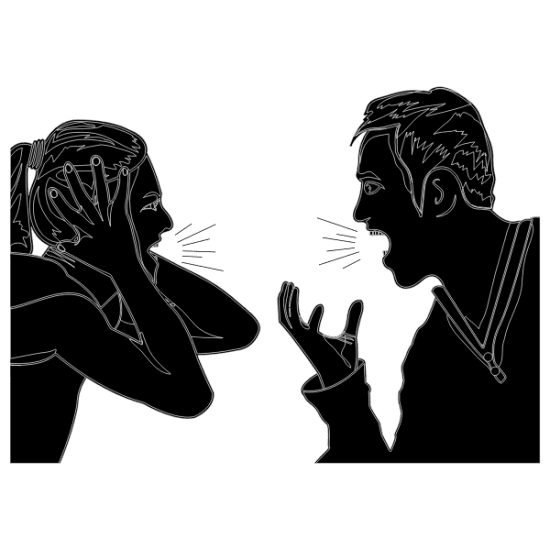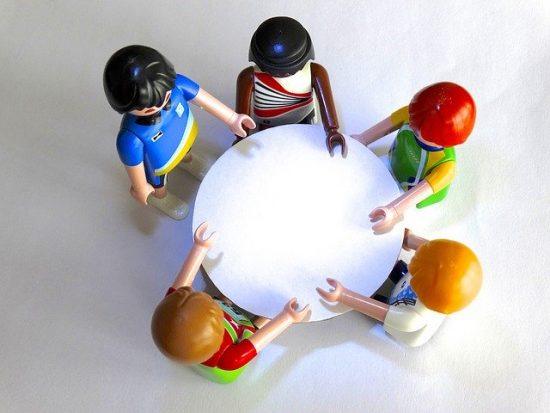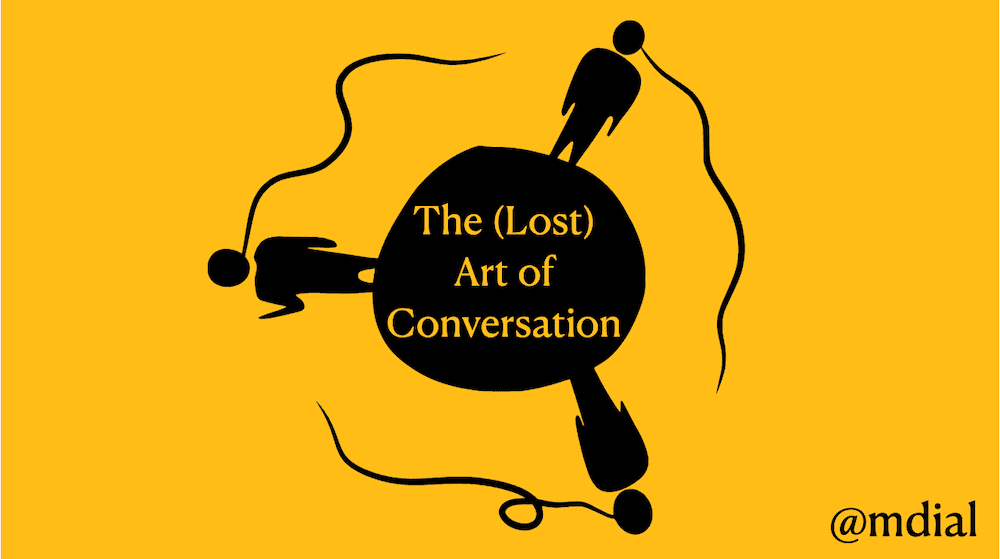“There is almost total partisanship, both on the right and the left…. neither side talks to the other, and the divide just seems to be getting worse.”
Does this sentence resonate at all? It was written by my great-grandfather, Nathaniel Barksdale Dial, a sitting US senator in 1924.

After the Great Depression, my grandparents found entertainment by reading out loud to one another and by engaging in lively discussions. Through writing the book, The Last Ring Home, that recounts my grandparents’ lives through World War II, I became wistful for the good old-fashioned values of courage, love and honor.
In today’s emotionally charged world, ridden with a pandemic, economic hardships and social upheaval, it’s become evermore clear for me that we are losing the ability to have great conversations. What do I mean by “great,” you might ask? First, that the exchange is mutual and meaningful. Secondly, it is vibrant and civil. Lastly, it moves all the participants. But such moments are unfortunately rare. In this post, I’ll explore why and how we’ve come to this situation, why it’s important we fix it and, lastly, a few skills and tools we can use to rebuild the art of conversation at home and work.
The undoing of conversations

Several things have transpired to undo our natural desire to have great conversations. First, we don’t “have” the time. To be clear this is a choice. The little voice in our head is constantly telling us to be more efficient and ‘to stop wasting time.’ We are literally all exploding with an ever-lengthening list of things to do. We feel that we are already behind before we’ve even started. To compound matters, we tend to subscribe to the planning fallacy that suggests that tasks take less time to complete than is really the case. Hence, our to-do lists stay doggedly long.
Secondly, and related to the first point, a great conversation is less about talking than it is about listening. And we all know that listening takes time and an ability to be present. We are beleaguered by a swarm of digital distractions. Proper listening means putting aside our automatic mental filters, tuning out our digital notifications and ditching our ego.
Thirdly, we have to be ever so careful about the opinions we hold in public for fear of saying the wrong thing or offending someone (even out of context). We are now just one tweet away from being slammed.
Fourth, and not least, we all want to exist, to make our presence felt. We often tend to prefer telling our opinion, recounting our perspective, with the underlying presumption that we are right and/or that ours is the most worthwhile point of view. It’s more about discourse and driving the narrative. To wit, we are bombarded with un-engaging tweets, legions of blog posts without commentary, TV talk shows that don’t involve interaction (other than studio applause), round tables that are rarely round, politicians with talking points and journalists who frown upon comments deposited on their columns (yes, still!).
Building bridges
Having a meaningful conversation is a way to build a bridge with other people. It takes three key ingredients, including having the right…:
- People
- Intention
- & Skills

In terms of people, this means those who are willing to be open to others and have something relevant to say (i.e. beyond platitudes or unfounded opinions). Intention is vital because real conversations require going into unmarked territories that can easily involve emotions and/or new forms of expression. Finally, there are some required skills including the craft of speaking, empathy and a genuine curiosity to explore and learn. All in all, meaningful conversation is about building bridges from different shores. And one of the more intentional aspects is seeking out conversations with people on the other side of the spectrum.
| “He who knows only his own side of the case knows little of that.” -John Stuart Mills, On Liberty |
To the extent we live in an evermore divisive society, it’s my conviction that the ONLY way forward is to entertain more full conversations. To elevate the issue, it’s about dialogue or conversation with purpose.
To the extent we live in an evermore divisive society, the ONLY way forward is to promote #dialogue and #conversations with purpose. Share on XWe need to re-develop key skills, including the ability to listen actively, ask probing questions, and relish the other person’s perspective as an opportunity to learn. Through conversation, where we put aside our immediate flight/fight attitude (that sits in our amygdala) and listen intentionally (without interrupting), we can grow. A crucial piece of the puzzle is the ability to accept that you can be wrong, to have the courage to recognize and avow when you’ve learned something new.
We can discern that behind a sentence taken out of context there may be a more profound and useful sentiment or belief. Behind a voice we don’t like, there may be a sound thought. Behind a façade, there’s a more human existence. In each instance cited, it’s an opportunity to build a bridge. And, the likelihood is that in making connections with other people, we’ll not only learn, we will feel better about ourselves. Mark my words: it’s not that we have to like everyone, appreciate everything we hear or jettison everything we believe. However, by practising the art of great conversation, connections are inevitably made.
The art of dialoguing

Over the last ten years, I’ve been hosting a podcast entitled the Minter Dialogue with nearly 400 episodes. My podcast is a conversation with someone else whom I find interesting. I like to consider my ‘interviews’ more as a dialogue than a series of questions and answers. Not that I need to have my voice heard, but from the perspective of developing thoughts and connecting dots, it’s far healthier to consider the podcast as an exchange. When I listen to long-form conversations such as those held by the brilliant Amit Varma (host of The Seen and the Unseen podcast), it takes considerable prep work and, more saliently, an ability to listen deeply. As knowledgeable as Amit is, he always demonstrates humility and patience with his guest, all the while having the courage not to roll over on every opinion shared. Amit shows how to let the other person shine, connect the dots and allow the conversation to evolve.
Practicing empathy
The final skill that I believe is necessary in order to have great conversations is empathy. This is especially necessary when dialoguing with someone who has a different background or perspective than your own. Sometimes, empathy means understanding that the other person expresses themselves differently. For example, they might not be speaking in their mother tongue. More often than not, it means leaning in to try to understand what the other person is thinking and feeling — especially when those thoughts and feelings might be foreign to you. Practicing empathy with people on the other side of the spectrum is challenging and it’s where you’ll find the juiciest conversations.
Bringing conversation into the workplace

The challenge of having meaningful conversations at work is rendered all the more complex because it may involve sharing some deeper personal thoughts and emotions. Spritely water cooler conversations can happen, but profundity is usually the exception. I’ve heard some argue that the shared cigarette or vape outside tends to generate more interesting discussions. In the pandemic lockdown mode, of course, these types of meet-ups have all but disappeared. But, in time, these conversations will return. The informal and personal exchanges are vital for cohesion and stimulation.
I have employed two distinct tools for helping to encourage more meaningful conversations at work:
- The Empathy Circle — using the power of empathy to understand and exchange at a deeper level (developed by my friends Edwin Rutsch and Lidewij Niezink)
- The World Cafe – putting insightful conversations at the heart of your business. Find out more here.
Both tools, at their core, are about encouraging participants to listen, contribute and connect the dots. As leader, once you demonstrate the behavior you’d like to see happen, it will empower others to do the same. Individuals will find great motivation when they believe that their contributions matter and that their voices are being heard. By being heard, you feel that you exist. As Chris Brogan wrote in a recent newsletter (subscribe here because it’s great):
| “No one likes to be sold to but everyone loves to buy. Imagine learning that people buy best when they feel seen, heard, and understood.” |
Fostering conversations at work that involve personal matters is a way of developing greater trust. You can’t agree on everything, but that’s the point. It may be messy, but so too are relationships. Great results at work are the fruit of trustworthy relationships. We’ve seen how, during the pandemic, personal affairs have been allowed into the professional space (e.g. the cat or kid in the Zoom background…). May this be one of the silver linings that persists in a post-pandemic era.
Reinventing the Salon

And, on the home front, we also need to make sure that there is a time and place for meaningful conversations. For the past twenty years, my wife and I have converted our dinner parties into a form of salon, where we explore different topics with varied groups of friends. Our intention is to use themes to discover one another, including very much between my wife and myself, in a novel manner and via the way we discuss the theme. I consider it an art form, inviting an appropriate collection of friends, concocting the theme (N.B. no subject is off the plate) and orchestrating the evening. But the real charm is the lingering energy that comes from having seen our friends meet and connect, bond over an event and then leave — even late into the night — with a special spring.
It’s an art…
If conversations have too often become staid or bereft of meaty exchanges, I know the desire to entertain great conversations remains. It’s a fundamental part of our human experience. Whereas we all think we are good conversationalists, the forces above tend to get in our way. It’ll take a good deal of self-awareness to allow more great conversations into your life. It’s a skill that requires practice. Here’s the beauty behind the art of conversation: it brings about connection and generates positive energy.
The beauty in the art of conversation is that it brings about connection and generates positive energy. #artofconversation Share on XPlease comment, debate and/or refute as you wish. I’m always up for some good dialogue.
***If you like my writing and are interested in fostering more meaningful conversations in our society, please check out my Dialogos Substack. This newsletter will feature articles on why and how we can all improve our conversations, whether it’s at home, with friends, in society at large or at work. Subscription is free, but if you see value in it, you are welcome to contribute both materially and through your comments. Sign up here:












Hi Minter
I am Ginza and came to know abt you through Amit Varma’s tweet. I am glad I did 🙂 You seem to have great content.
I had begun to read this article but the font size is making it difficult for me.
Wd you consider a bigger font size?
Best
Ginza!
Hi Ginza, you bring up an excellent point. I’m going to look into it. Thanks for coming by and commenting! And sorry for the “small print”!
Ginza, we have now added an add-on that allows you to increase the font (right column on the desktop browser and at bottom of post on mobile (want to try to get it above post though).
Goodness, Minter, when I pressed that it was like magic!! So much more comfortable to read now. Thank you!! Guess what, for books with smaller font size, I bought a magnifier 😀
Went through your newsletter. Thank you. Hard times. Yoga n meditation help me a lot to remain upbeat.
Cheers!
Hurray! Glad you could take advantage of it!! 🙂
Nice article Minter – any piece that quotes JS Mill on liberty deserves attention .
I’m struck by the haunting echos between the great depression and slide towards populist nationalism during the 20s and 30s and what we see today.
Then as today the economic and social upheaval led to a widening of the divisive gap between the super rich and poor.
Then as today, this was set against the backdrop of a revolution in the tools of mass media communication.
In both cases, instead of helping us find commonalities mostly these communication tools have been used to highlight our differences and divide us into tribes set against one another.
I think JS Mill would have a lot to say about how the Western liberal ideal of the individual have proven so divisive in the digital age. The democratisation of media, that many imagined just a decade ago would connect us, has become about reaffirming and underlining ones own identity in opposition to others, and about presenting that – curated – to the world. The space between us has widened.
Im all for empathy & conversation, but as you say our social and work incentives allow little time for them. Im contantly amazed by the power of open & honest conversation to overcome seemingly impossible differences.
My fear is that we are too far down a path and that a total reset (as in the early 20th century) will be required. We seem obsessed with the shiny and focused on technological solutions to inherently human problems. I don’t believe technology is yetsophisticated enough to solve the problems i
our global society like trust, ethics morality and empathy.
Hi James, I certainly don’t think tech is going to provide the fix or solution. As for mass media, the fact that partisanship helps to sell (eyeballs etc) means that the incentive isn’t there to take up the opposing view(s).
True Minter. if the incentive isn’t there to take up an opposing view as you suggest- and I think you may be right – then how does it play out? It doesn’t paint a very optimistic view of near future unless someone can change the incentives.
I’ve been trying to understand/follow the trend of nascent non-traditional media channels that are calling for “freedom of speech” and “truth uncovered.” There are a couple of initiatives in France. In the UK there is UNHERD and LONDON REAL (very different styles) among others. What’s also interesting is to see how/which economic business model they will countenance in order to be able to sustain that freedom. Isn’t ironic that the word freedom starts with FREE? I’m inclined to say that we need an economist in our midst to keep the idea of great conversations grounded in reality! Otherwise, it will just be about holding our secretive or private conversations.